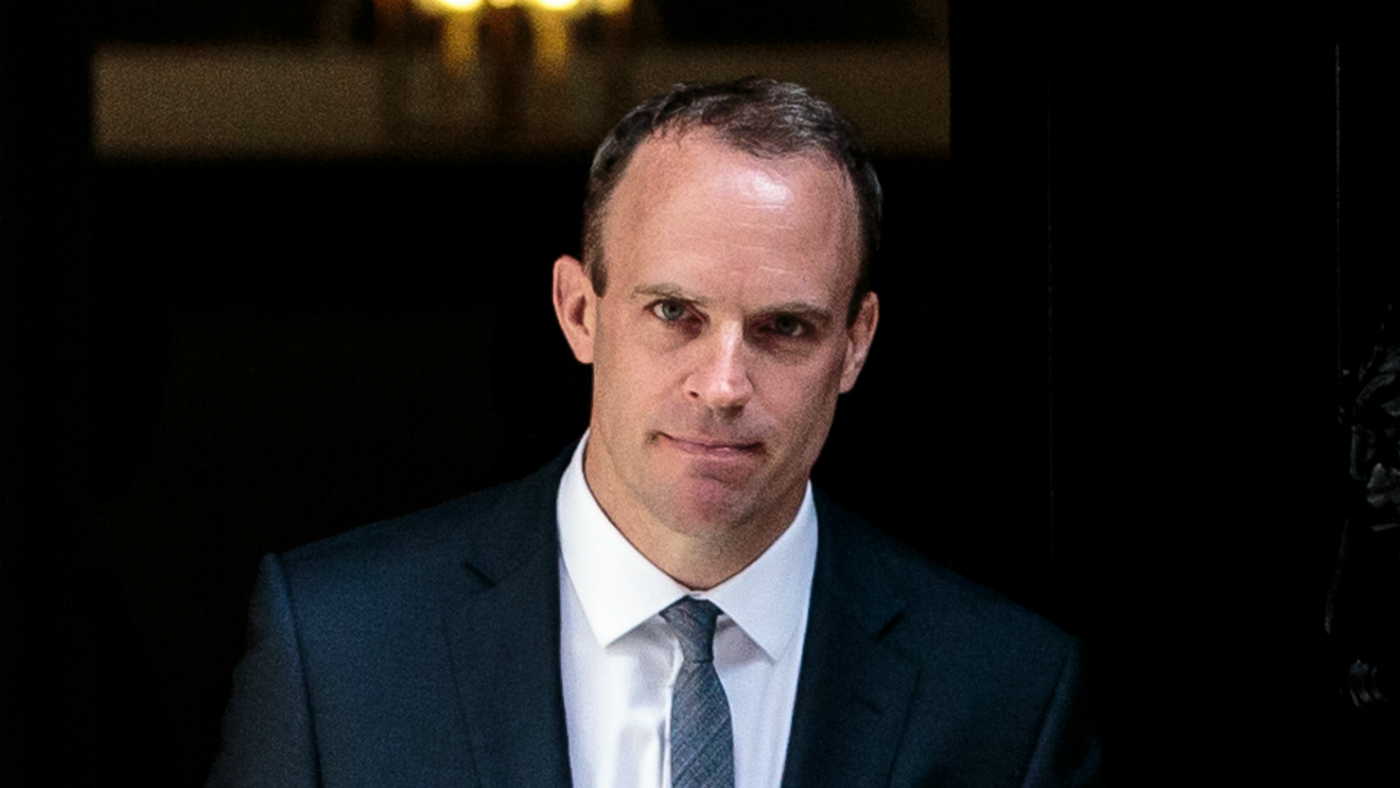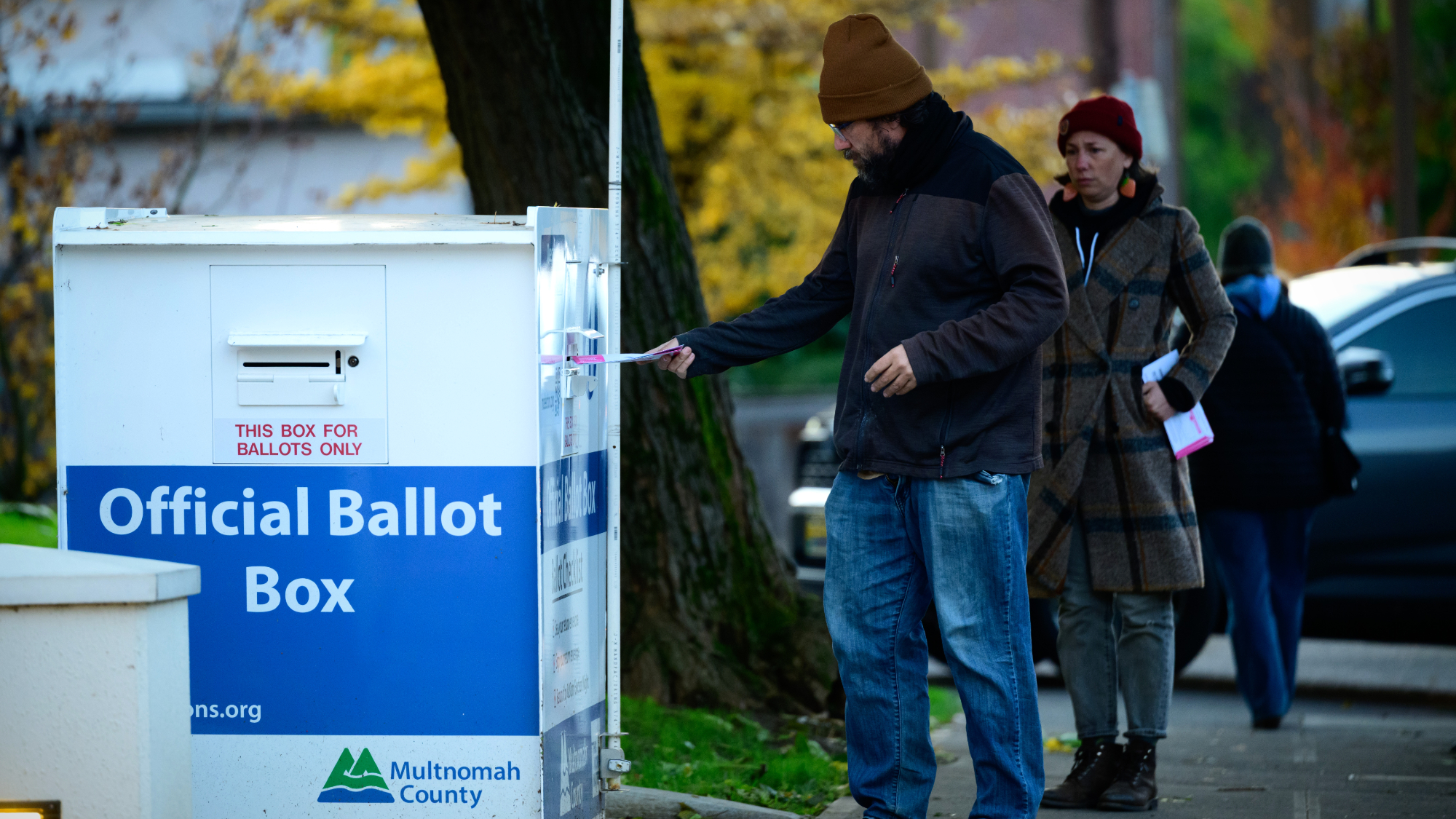Dominic Raab: deputy PM quits after bullying report
Sunak ally and Justice Secretary resigns after independent inquiry found he had acted in an ‘intimidating’ way

A free daily email with the biggest news stories of the day – and the best features from TheWeek.com
You are now subscribed
Your newsletter sign-up was successful
Dominic Raab has resigned as justice secretary and deputy prime minister after a five-month inquiry into allegations of bullying reported to the prime minister.
The inquiry, conducted by senior lawyer Adam Tolley KC, was ordered by Rishi Sunak after complaints about Raab’s behaviour as a minister.
It found that on one occasion Raab had “acted in a way which was intimidating, in the sense of unreasonably and persistently aggressive in the context of a workplace meeting”.
The Week
Escape your echo chamber. Get the facts behind the news, plus analysis from multiple perspectives.

Sign up for The Week's Free Newsletters
From our morning news briefing to a weekly Good News Newsletter, get the best of The Week delivered directly to your inbox.
From our morning news briefing to a weekly Good News Newsletter, get the best of The Week delivered directly to your inbox.
This “conduct was bound to be experienced as undermining or humiliating by the affected individual, and it was so experienced”, the report said.
Tolley’s verdict is “likely to end” Raab’s “abrasive political career”, said The Guardian.
In his resignation statement, Raab said that the inquiry “dismissed all but two of the claims levelled against me”. He insisted that the conclusions of a report into his conduct set a “dangerous precedent” but stressed he wanted to “keep his word” after he had undertaken to quit if it found against him.
Who is Dominic Raab?
Raab was born in Buckinghamshire to a Czech-born Jewish father who came to Britain in 1938 as a refugee.
A free daily email with the biggest news stories of the day – and the best features from TheWeek.com
He studied law at Lady Margaret Hall, Oxford, and for a master’s at Cambridge, winning the Clive Parry Prize for International Law. He began his working career as a business lawyer at City law firm Linklaters, where he specialised in project finance, competition law and international litigation.
He also completed secondments at human rights NGO Liberty and in Brussels advising on European Union and World Trade Organization law, the government website said.
From 2000 to 2006, Raab worked at the Foreign and Commonwealth Office (FCO) on a range of issues including investor protection. As an FCO lawyer, Raab was also the lead on a team “focusing on bringing war criminals to justice at The Hague”, the BBC reported.
He is married to Brazil-born Erika, a former Google marketing executive, with whom he has two sons. He holds a black belt third Dan in karate and is a keen boxer, with a picture of Muhammad Ali reportedly spotted hanging in his Commons office.
Raab’s parliamentary career
Raab is “not short on experience”, said Tominey in The Telegraph last summer, when he was being talked about as a potential successor to Boris Johnnson. He became MP for Esher and Walton, a safe Tory seat, in 2010, and has served in government since after the 2015 election, initially working in the Ministry of Justice before moving to the Ministry of Housing, Communities and Local Government in January 2018.
In 2017, Raab was described as “offensive” by then Liberal Democrat leader Tim Farron, after saying that “the typical user of a food bank is not someone that’s languishing in poverty, it’s someone who has a cash flow problem”.
Brexiteer Raab was promoted to secretary of state for Leaving the European Union in July 2018, a post he held until November 2018, when he resigned over his disapproval of Theresa May’s EU Withdrawal Agreement.
He “famously received a slap down from [May] in 2011 in her role as minister for women and equalities”, after he labelled feminists “obnoxious bigots”, said The New Statesman.
Raab ran in the race to succeed her as Tory party leader in 2019, but was eliminated in the second ballot of Conservative MPs and instead endorsed Johnson for the job.
Johnson subsequently named him foreign secretary and first secretary of state (effectively deputy prime minister), in July 2019. In April the following year, Raab took over the PM’s responsibilities while Johnson was hospitalised with Covid. At the time, colleagues told Politico that the state secretary would be “a forensic stand-in” for the PM – “albeit one who sometimes lacks charm”.
Last September, Raab was demoted to the role of lord chancellor. But he “insisted” that as well as becoming secretary of state for justice, he should also have the official title of deputy prime minister “rather than the de facto role of first secretary of state”, a demand that sparked curiosity as to whether Raab “had let his ego get the better of him”, said The Telegraph’s Tominey.
Bullying allegations and resignation
In November last year, The Guardian reported on allegations of bullying against the deputy PM from the civil service. One source saying Raab had created a culture that was “demeaning rather than demanding” and that the minister “wasn’t just unprofessional, he was a bully”. The Guardian’s article was quickly followed by similar allegations in The Sun and The Mirror.
John Stevens, the political editor of The Mirror, then reported that Raab had been nicknamed “The Incinerator” by workers at the Ministry of Justice “as he burns through officials”.
A total of 44 pieces of written evidence and 66 interviews were taken into consideration by Tolley, when putting together the report into Raab’s behaviour and Raab himself was interviewed four times.
The report eventually concluded that Raab had “acted in a manner which was intimidating, in the sense of going further than was necessary or appropriate in delivering critical feedback”.
In a column for The Telegraph explaining his decision to resign, Raab described the bullying inquiry as “Kafkaesque” and said that “normal rules of evidence and procedural fairness were disapplied”.
His resignation caught some by surprise. ITV’s political editor, Robert Peston, tweeted last night that, having read Tolley’s report, Raab “believes it does not show he breached the Ministerial Code, and therefore he will not be offering his resignation”. Sunak would have to “decide whether to sack him”.
This morning, speculation has turned to whether Raab jumped before he was pushed – or was fired. Tom Newton Dunn, presenter of TalkTV’s politics programme, tweeted that there was “no acceptance in Raab’s resignation letter that he bullied”. The letter was “an outright attack on the Tolley report instead – so he was clearly fired rather than walked”, he added.
However, the BBC’s chief political correspondent, Nick Eardley, said this morning “sources inside Downing Street are insisting” that Sunak “did not ask Dominic Raab to resign”.
The “coming days” will “tell us more about the extent to which Raab was pushed or jumped”, said CNN. “If it’s the former, he could have reason to make life difficult for Sunak later down the line when he struggles with Johnson allies on the right of the party”.
-
 How the FCC’s ‘equal time’ rule works
How the FCC’s ‘equal time’ rule worksIn the Spotlight The law is at the heart of the Colbert-CBS conflict
-
 What is the endgame in the DHS shutdown?
What is the endgame in the DHS shutdown?Today’s Big Question Democrats want to rein in ICE’s immigration crackdown
-
 ‘Poor time management isn’t just an inconvenience’
‘Poor time management isn’t just an inconvenience’Instant Opinion Opinion, comment and editorials of the day
-
 How are Democrats turning DOJ lemons into partisan lemonade?
How are Democrats turning DOJ lemons into partisan lemonade?TODAY’S BIG QUESTION As the Trump administration continues to try — and fail — at indicting its political enemies, Democratic lawmakers have begun seizing the moment for themselves
-
 How corrupt is the UK?
How corrupt is the UK?The Explainer Decline in standards ‘risks becoming a defining feature of our political culture’ as Britain falls to lowest ever score on global index
-
 Grand jury rejects charging 6 Democrats for ‘orders’ video
Grand jury rejects charging 6 Democrats for ‘orders’ videoSpeed Read The jury refused to indict Democratic lawmakers for a video in which they urged military members to resist illegal orders
-
 Lawmakers say Epstein files implicate 6 more men
Lawmakers say Epstein files implicate 6 more menSpeed Read The Trump department apparently blacked out the names of several people who should have been identified
-
 The Mandelson files: Labour Svengali’s parting gift to Starmer
The Mandelson files: Labour Svengali’s parting gift to StarmerThe Explainer Texts and emails about Mandelson’s appointment as US ambassador could fuel biggest political scandal ‘for a generation’
-
 Trump's ‘weaponization czar’ demoted at DOJ
Trump's ‘weaponization czar’ demoted at DOJSpeed Read Ed Martin lost his title as assistant attorney general
-
 Trump sues IRS for $10B over tax record leaks
Trump sues IRS for $10B over tax record leaksSpeed Read The president is claiming ‘reputational and financial harm’ from leaks of his tax information between 2018 and 2020
-
 Judge tosses DOJ petition for Oregon voter data
Judge tosses DOJ petition for Oregon voter dataSpeed Read The decision was made following a letter sent by the DOJ to Minnesota